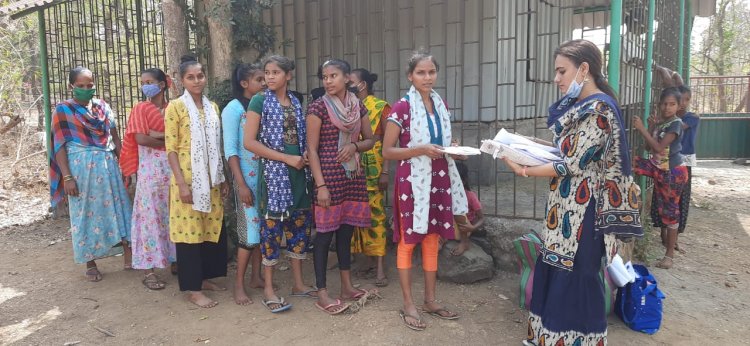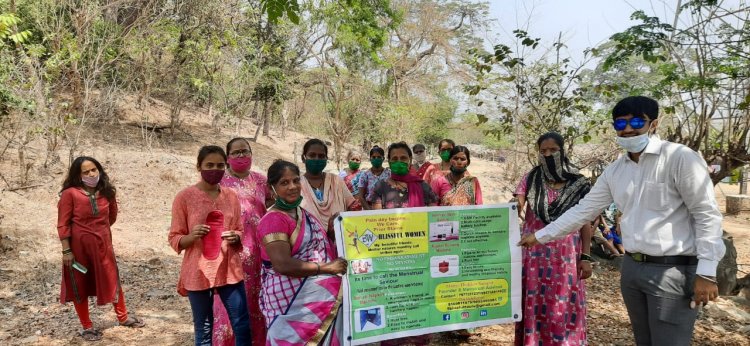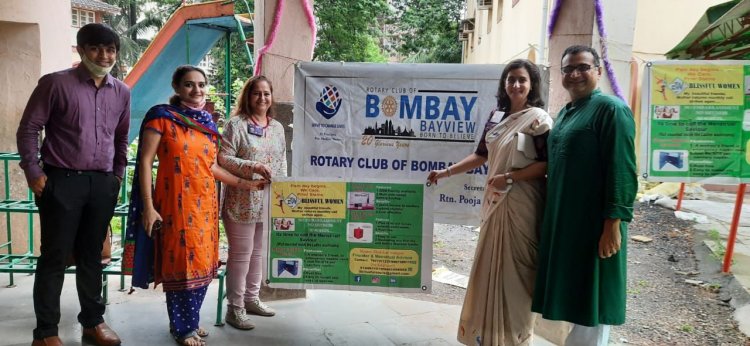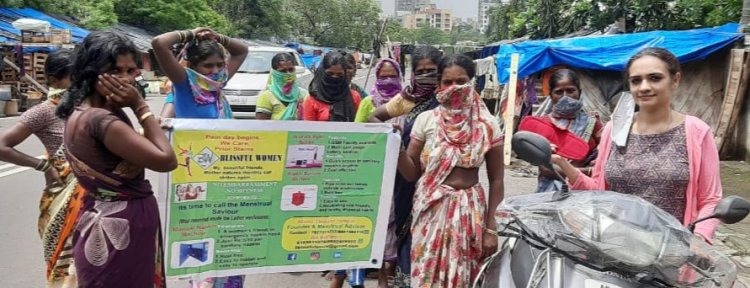It is a myth that plastic sanitary napkins are the safest option during periods, says Social Entrepreneur Mansi Sampat

While in a women's lifespan, her mensuration is expected to start from around the age of 11, until the age of 45 years not many women are yet aware of the implications of using unconventional methods that could lead to giving them severe infections.
Mansi Sampat is a social entrepreneur with a mission to help every woman stuck in a period cycle. To contribute something back to the society, she started and initiative 'The Blissful Women’ with an aim of instilling in minds of people that ‘Menstruation Matters, Period’.
Mansi possesses an M.com, Ecced & ad., Diploma in travel & tourism and has completed short courses on world puppetry & laughter yoga coach.
Here are the excerpts of our conversation with the Blissful Woman, Mansi Sampat. Check them out!
Tell us something about why and how you laid the foundation of ‘The Blissful Women'.
It was when I started working as a freelancer, while traveling to remote areas of our country I realized that not a lot of women are aware of menstruation hygiene, due to which a lot of them suffer through severe infections. It was during the same time that once while I was stuck in my period cycle and discovered a sanitary napkin vending machine in one of the corporate offices I had visited for a meeting. I realized that 90% of working women and girls never get this facility if they face an emergency during their periods. While researching a little more on this, I discovered that while all women in urban areas use sanitary pads, none of them know the proper way to dispose them, since throwing them in the garbage is not the best solution for our environment. Thus, ‘The Blissful Women’ was born to spread awareness about sustainable hygiene period products and practices such as cloth pads, sanitary napkin vending machines and cremation machines.
While menstruation is a natural medical condition that almost every woman goes through monthly, very few know the real consequences of using sanitary napkins. Please throw some light on the same.
While plastic sanitary napkins are promoted commercially as the best solution for periods, many women face ill-effects of napkins, like rashes in the thigh areas, irritation, burning sensation, etc. which eventually becomes red patches that are unbearable. As plastic pads fold from corners, many times brushing the plastic layers with skin and vaginal areas also causes infections. PCOD and PCOS issues faced by young girls are the untold story of every alternate house. Many women do not discover the cause of their problems as they majorly blame either their diet or lifestyle.
What kind of activities take place under your campaign?
We have tied up with NGOs as well as individual donors, and work in collaboration with many corporations for their CSR activities. Through the funding we that receive from them, we adopt rural villages and do menstrual hygiene programs in those areas. We also distribute reusable cloth pads and encourage women to use them and contribute towards zero-waste emission due to menstruation in the environment for the next two years.


How has been your journey so far with ‘The Blissful Women’?
A roller coaster ride! The journey so far has been very challenging and different. Now-a-days people are becoming more aware about hazards of plastic but convincing them to play their own part in contributing towards a good environment is still a dream. However, I do meet eco-friendly people also who understand and support my drives too. The idea of clean India and green India will soon be a part of daily routine, for everyone and ‘The Blissful Women’ is doing its own bit.
Menstrual taboo in India is still a huge issue. How do you think we can eradicate it?
While menstrual hygiene is slowly but steadily becoming a conversational piece, it still requires more people to speak about it and bring it to light.
NGOs and CSR heads should take up menstruation hygiene and spread awareness on the health hazards of not using the proper sanitary solution during periods. Regional leaders and nagar sewaks should actively pick up such programs and spread awareness in their designated areas by working at the grassroots level. All such activities will contribute to not just spreading the awareness but also breaking the taboo.
Please share some myths and their related facts about sanitary napkins and tampons in India.
It is a myth that plastic sanitary napkins are the safest option during periods. Now-a-days, the pads that are available in the market comprise lot of gels, chemicals, plastics which pollute landfills and are unsafe for ladies too. Tampons are considered cool to insert and use, but they also may give leaks. Moreover, tampons sometimes can lead to toxic shock syndrome.
Women can save our environment by switching to sustainable period hygiene products. How?
These days women have two options when it comes to choosing sustainable period hygiene products. If they choose reusable cloth pads, they generate 0% waste for the next two years, and if they choose menstrual cups then they generate 0% waste for the upcoming 5 to 6 years. In both these options we do not throw plastic-based sanitary pads, which take around 700 years to decompose.
Tell us something about your upcoming initiatives.
Currently, through ‘The Blissful Women’, we are in process of a crowdfunding campaign through which whatever money we collect, we will be visiting in the rural part of our city and spread awareness about menstrual hygiene. We also plan to distribute cloth pads to these young girls and women with an intention to safeguard them from infections and health-related problems, which might occur due to using non-sanitary products during the time of periods.


What is your opinion on (gender) equality? How important is the issue in the current times?
While we are moving towards a generation where there have been attempts in our society to bridge the gap between men and women, we are still a generation or two away from where we can consider that women and men are equal. While in urban areas there are many families who consider their daughters to be as equal as their sons, in rural India girls have a higher dropout ratio. As soon as they reach puberty, they get married or leave school to work at home. In current times, schemes such as BETI BACHAO, BETI PADHAO, taken by the government are really appreciated, but it also reflects that the issue of gender inequality is still widespread.
What main change would you like to see for young girls in the next generation?
Speaking about the next generation, it would be great to see those young girls are given equal opportunities as boys get in today's times. Young girls should be made more aware about personal hygiene at school and home. Also, programs should be inculcated to teach them self-help and safety training.
Do you think Women’s Day should be celebrated? Why?
Yes, women's day should be celebrated not just every year, but once every month. This will encourage people to remember the contributions of women in society. Be it a mother, a teacher, a guardian, a savior - name a role and she can do it as goddess Durga resides in every woman, and society should not forget this!
Apeksha Sandesh congratulates Mansi Sampat for her contribution and commitment towards society with her initiatives in eradicating menstrual taboo and helping people deal with it. We wish her good luck for all her future endeavours!














































